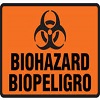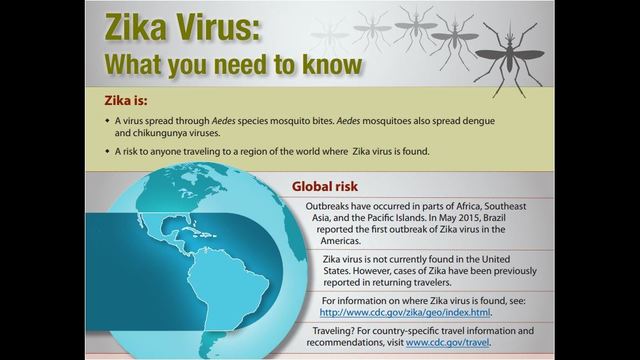Infectious Diseases

Infectious diseases are also called communicable or transmissible diseases and can be spread from person to person. They are caused by tiny organisms such as viruses, bacteria, parasites, fungi and others.
An infectious disease can be transmitted in a number of ways, including by food, water and air as well as physical contact with a contaminated object or another person. Some diseases are more infectious than others because of the type of organism that causes the infection or because of the way in which the infection is transmitted.
Some people are more susceptible to infection because of underlying diseases such as diabetes or kidney disease or cancer or AIDS. When the body’s natural immunity, or protection against disease, is low, infection is better able to occur.

TAMUG Mosquito Prevention and Control Plan 2016
Zika virus is transmitted by the bite of infected mosquitos (Aedes aegypti); these mosquitos bite during the daytime, not just at dawn and dusk. Although not as common, Zika virus can also be spread sexually. It typically causes mild illness in only 1 out of 5 infected people, with symptoms lasting several days to a week. Symptoms include:
-
Fever
-
Rash
-
Joint Pain
-
Conjunctivitis (red eyes)
However, in some pregnant women, the virus is linked to birth defects, resulting in the birth of children with abnormally small heads and incomplete brain development with poor outcome.
The CDC advises abstinence or the use of condoms for all types of sexual activity if the partner of a pregnant woman lives in or travels to a country affected by Zika virus. Women who are pregnant should avoid travel to areas with active Zika transmission. Couples trying to become pregnant should follow the same guidelines and also consult their health care provider, or CDC, for the latest guidance on delaying conception if one or both partners have traveled to an area with active Zika virus or it either partner has had Zika infection.
There are no reports of Zika virus being transmitted locally in Dallas or Texas. However, imported cases make local spread by mosquitos possible since Aedes aegypti mosquitos are found in Texas. The best way to avoid Zika virus is to remember the 4 Ds and use condoms to protect against sexually transmitted diseases. Zika virus is treated with supportive care and there is no vaccine to prevent the disease.
The 4Ds for Mosquito Bite Prevention:
-
DEET: All Day, Every Day: Whenever you’re outside, use insect repellents that contain DEET or other EPA approved repellents and follow instructions
-
DRESS: Wear long, loose, and light-colored clothing outside
-
DRAIN: Remove all standing water in and around your home
-
DAWN, DAYTIME & DUSK/EVENING: Be aware mosquitos are active during all these hours
Avoid unnecessary travel to countries with high rates of Zika infection. CDC travel alerts: http://wwwnc.cdc.gov/travel/page/zika-travel-information
Information on Zika virus: http://www.cdc.gov/zika/
EPA approved insect repellents: https://www.epa.gov/insect-repellents/find-insect-repellent-right-you
